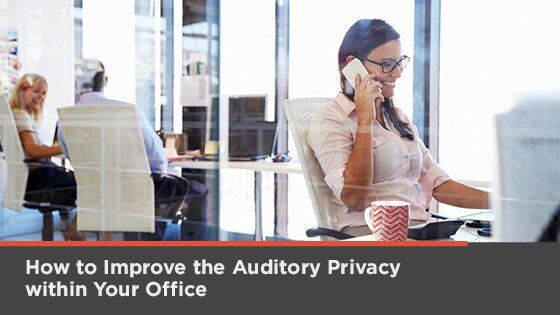Search for topics or resources
Enter your search below and hit enter or click the search icon.
January 2nd, 2025 | 2 min read
By CJ Porteous

Are conversations from other spaces affecting your team’s productivity? Are there concerns about private customer information being overheard? Do you merely want to help visitors and employees feel more comfortable in your office?
Not only does an office with poor auditory privacy have a severe lack of privacy, but it can also be downright impossible to focus and work when everyone else’s discussions are within earshot. There is a particularly pressing issue when the question of customer confidentiality is concerned.
In industries like healthcare or finance, there are strict rules and regulations about the protection of client data. However, no amount of computer security or document management can overcome a poorly designed office where every word can be overheard.
How can businesses improve auditory privacy to ensure information about their employees and customers is kept confidential? There are several steps you can take depending on your specific needs and office layout.
There is a reason standing above a canyon, and yelling will often elicit a response in the form of an echo. Sound waves bounce off hard surfaces and continue to travel rather than being absorbed. Choosing the materials to use in an office space is imperative.
Hard materials like wood and plastic can create a space where the sound can continue travelling. However, using soft materials can help absorb sound waves and prevent discussions or noisy distractions from moving throughout the office.
When designing workstations for your office, sound should be an essential consideration alongside comfort and style. Soft panel walls will provide greater privacy when compared with solid, hard walls.
Adjusting the panel height between workstations to be above the user’s seated line of sight, or even adding moveable walls between stations, can provide significantly more auditory and visual privacy.
Not all privacy issues can be resolved with wall panels. In fact, drop ceilings are a significant enemy of auditory privacy. The hard, smooth, and flat ceiling panels allow sounds waves to bounce throughout a space with no regard for privacy.
The result is that conversations can easily travel through the empty spaces in the ceiling for everyone to hear. Even with a closed door and four solid walls, conversations can clearly be heard outside of the intended area.
Ceiling baffles are thick, soft pieces of fabric that are hung vertically to help absorb sound waves. The large surface area provides more space for the sound waves to come in contact with a soft surface.
The final result of adding ceiling baffles is improved privacy. Conversations can no longer travel unimpeded throughout the office when ceiling baffles are installed.
In some cases, there may be a justification for adding acoustic panels. These panels are made of foam and fabric. Acoustic panels look more at home in a recording studio, but they also play an important role in office auditory privacy.
Basic acoustic panels will get the job done, but there are higher-end options that are more stylish, sleek, and modern. Depending on the style and layout of your office, you may want to consider the more expensive but less traditional acoustic panels to help achieve optimum auditory privacy.
Sound masking equipment sounds like something out of a sci-fi movie. In essence, this equipment produces ambient noise at the same frequency as the human voice to give people a quieter, more private space.
While the technology may sound new and experimental, it has been used for decades in many commercial applications like call centers. As modern offices move to more open floor plans, sound masking equipment has become increasingly popular.
By implementing sound masking technology, offices effectively limit the area where a conversation can be clearly heard. It also prevents other noise from distracting people trying to have a private discussion. The result is a quieter, more comfortable workspace.
Auditory privacy is vital for businesses, and each space will have its own unique needs. Ensuring confidentiality and limiting distraction begins with thoughtful design, furniture choices, and office layout. Adding additional tools like sound masking equipment, ceiling baffles, and acoustic panels will help create the private, professional experience you are looking for.
Want to dig a little deeper into open office privacy? We also wrote a companion article that discusses visual privacy!
Cory Porteous
Marketing Manager
Office Interiors
If you’re ready to start improving productivity, streamlining processes, and love the way you work through optimized workspaces and office technology, contact us today. Our team of experts is here to help!
Topics: